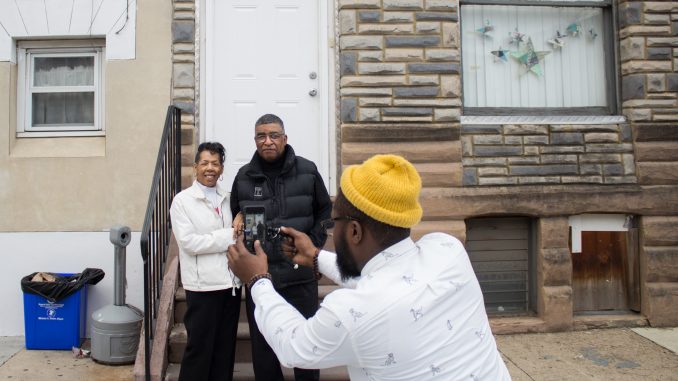
Almost 30 years after it was taken, Alice Gabbadon still keeps a photo of her brother, Charlie, and two of his friends. The three men are pictured sitting on the corner of 22nd and Greenwich streets in Point Breeze, where Gabbadon and her family spent their entire lives.
Now, she sees people on the same corner buying and selling drugs.
“He’s dead, he’s dead, he’s dead,” she said, gesturing purposefully to each subject in the photo. “All because of drugs.”
Gabbadon has lived all her life in Point Breeze, and she said her neighborhood is changing in more ways than just the influx of drugs.
“I’d love to see my neighborhood come back,” she said.
To discuss gentrification and the change she’s experiencing in Point Breeze, Gabbadon attended a roundtable storytelling workshop on Jan. 16 headed by Lisa Nelson-Haynes, the associate director of the Painted Bride Art Center and a Temple alumna.
Nelson-Haynes brought the group together as a part of her upcoming independent project, titled Redline Project. It strives to tell the stories of a gentrifying neighborhood—both from the perspective of the long-term residents and those new to the area. This workshop was the first of three planned for the project. Other attendees included residents of the Point Breeze community, local real estate agents and 2nd District Councilman Kenyatta Johnson.
Three interns from Temple are on board with the project. Sophomore journalism majors Angela Gervasi and Emily Scott and junior journalism major Brianna Spause have been working with Nelson-Haynes to tell the stories of gentrification in South Philadelphia.
“They seem to get automatically what I’m doing,” Nelson-Haynes said. “They got the tone that it was supposed to be. … I have to say, they nailed it. They nailed it 100 percent.”
Nelson-Haynes said the final product of Redline Project will have a digital and physical component. All the participants’ stories will be recorded and posted on the project’s blog, as well as set up as exhibits in the neighborhoods where the workshops took place.
“I’ve always felt like it’s important to capture people’s stories, their personal narratives,” Nelson-Haynes said. “I’ve been dreaming about this for awhile now.”
Her interest in Point Breeze began at a young age. As a child, Nelson-Haynes lived in Delaware County with her family, but she spent the weekends in South Philadelphia.
“It was a warm and inviting community of folks, whereas where I lived at the time in Delaware County, it was more of an all-white neighborhood,” she said. “There weren’t a lot of black folks around. I grew up having a strong affinity for that South Philly community.”
After she graduated from Temple in 2000, Nelson-Haynes gravitated toward South Philly. But when it came time for her and her husband to buy a home, she had been priced out of the neighborhood.
“I started to see the change down there,” she said. “You could see gentrification happening.”
Marjorie Jones, a partner with Redline Project, said her block in Point Breeze on Ellsworth near 17th, used to host about 90 percent African American residents. After some moved out or passed away, developers came into the neighborhood, flipped the homes and sold them for three times the amount they bought them for.
“People are frustrated with that,” Jones said. “I’m passionate about the long-term residents. They’re being pushed out of their homes for a measly amount of money.”
But Jones said change isn’t necessarily a bad thing, and she supports change that benefits the long-term residents, too.
“What was is no longer the way it is,” she said. “Change is constant. As long as it’s for the betterment of the community and for the area, I’m not opposed to it.”
Another partner with the project, Michael Bell, said he can see the benefits of gentrification in Point Breeze. He’ll know for sure, though, whether the newer residents value the community when he sees where their children go to school.
“Are they going to send their kids to the neighborhood schools?” he said. “That’ll be the real test, rather than trying to find a private school. If their kids are going to the public schools, then they believe in them. We’ll see.”
The next workshop will be held in the Graduate Hospital area of Southwest Center City on Feb. 6, and the third will be held in Grays Ferry in March. Nelson-Haynes said her goal is to finish the project in April.
“I’m really grateful that people are stepping up and saying, ‘I want my voice to be heard,’” Nelson-Hayes said. “‘I want you to understand what my commitment is to this community.’”
“This is how community continues,” she added. “You know, a sustainable community.”
Michaela Winberg can be reached at michaela.winberg@temple.edu.
Editor’s note: Angela Gervasi, Emily Scott and Brianna Spause have all contributed to The Temple News.
They played no part in the reporting or editing of this story.


Be the first to comment